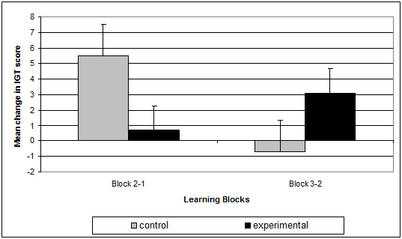The WAGER Vol. 12(10): Another DUI: Deciding Under the Influence of Emotion
Somatic markers (i.e., affective states associated with former experience) guide healthy decision-making (Bechara & Damasio, 2002). Research suggests that poor decision-making among disordered gamblers (Goudriaan, Oosterlaan, de Beurs, & van den Brink, 2005) might originate from prefrontal cortex dysfunction that impairs the use of somatic markers to guide decisions (Brand et al., 2005; Cavedini, Riboldi, Keller, D’Annucci, & Bellodi, 2002). However, recent research (Preston, Buchanan, Stansfield, & Bechara, 2007) suggests an alternative source of decision-making difficulties on gambling tasks: anticipatory stress.
Preston and colleagues (2007) assigned forty university students to either an experimental condition, in which they thought they would have to give a public speech after completing the Iowa Gambling Task (IGT: Bechara, Damasio, Damasio, & Anderson, 1994; Bechara, Tranel, Damasio, & Damasio, 1996), or a control condition (i.e., IGT only). The IGT has subjects choose between four card decks; each card is associated with either a win or a loss, and the decks differ in payoff rate. Disadvantageous decks give large immediate rewards but also large or frequent losses, whereas advantageous decks give smaller rewards but also smaller overall losses.
Figure 1. Improvement on IGT as a Function of Group and Learning Block
Note. The figure displays the improvement from block 1 -2, and from 2-3. Participants in the experimental group show significant (p<.05) delayed and diminished learning compared to controls. The negative score of the controls from block 2-3 is due to the fast learning from block 1-2, which makes further improvement difficult.
Individuals in the experimental group learned the task more slowly than controls (See Figure 1), more often failed to correct disadvantageous choices, and had suboptimal outcomes.
Though this study is limited by its small sample size, it might hold important implications for our understanding of disordered gambling. The findings suggest that anticipatory stress significantly influences the emotional guidance of decision-making; other emotional interference might have a similar effect. Therefore, impaired decision-making among disordered gamblers might not be due only to a neurological deficit as some have suggested elsewhere. Several studies have shown high co-morbidity between disordered gambling and emotional problems (e.g., depression, mania, or anxiety — Crockford & el-Guebaly, 1998; Petry, Stinson, & Grant, 2005). It is possible that these emotional problems have a similar influence to that of anticipatory stress on disordered gamblers’ decision-making, perhaps interfering with the somatic markers that ought to guide that decision-making and thereby exacerbating gambling problems. For example, research has found that depressed patients show impaired performance on the IGT (Must et al., 2006).
The potential influence of these emotional problems on decision-making in gambling situations reinforces the importance of recognizing and addressing these co-morbid disorders when treating people with gambling-related problems.
What do you think? Comments can be addressed to Line Gebauer.
References
Bechara, A., Damasio, A. R., Damasio, H., & Anderson, S. W. (1994). Insensitivity to future consequences following damage to human prefrontal cortex. Cognition, 50, 7-15.
Bechara, A., & Damasio, H. (2002). Decision-making and addiction (part I): Impaired activation of somatic states in substance dependent individuals when pondering decisions with negative future consequences. Neuropsychologia, 40(10), 1675-1689.
Bechara, A., Tranel, H., Damasio, H., & Damasio, A. R. (1996). Failure to respond autonomically to anticipated future outcomes following damage to prefrontal cortex. Cerebral Cortex, 6, 215-225.
Brand, M., Kalbe, E., Labudda, k., Fujiwara, E., Kessler, J., & Markowitsch, H. J. (2005). Decision-making impairments in patients with pathological gambling. Psychiatry Research, 133(1), 91-99.
Cavedini, P., Riboldi, G., Keller, R., D’Annucci, A., & Bellodi, L. (2002). Frontal lobe dysfunction in pathological gambling patients. Biological Psychiatry, 51, 334-341.
Crockford, D. N., & el-Guebaly, N. (1998). Psychiatric comorbidity in pathological gambling: a critical review. Can J Psychiatry, 43(1), 43-50.
Goudriaan, A. E., Oosterlaan, J., de Beurs, E., & van den Brink, W. (2005). Decision making in pathological gambling: A comparison between pathological gamblers, alcohol dependents, persons with Tourette syndrome, and normal controls. Cognitive Brain Research, 23(1), 137-151.
Must, A., Szabó, Z. n., Bódi, N., Szász, A., Janka, Z. n., & Kéri, S. (2006). Sensitivity to reward and punishment and the prefrontal cortex in major depression. Journal of Affective Disorders, 90(2), 209-215.
Petry, N. M., Stinson, F. S., & Grant, B. F. (2005). Comorbidity of DSM-IV Pathological Gambling and Other Psychiatric Disorders: Results From the National Epidemiologic Survey on Alcohol and Related Conditions. Journal of Clinical Psychiatry, 66(5), 564-574.
Preston, S. D., Buchanan, T. W., Stansfield, R. B., & Bechara, A. (2007). Effects of anticipatory stress on decision making in a gambling task. Behavioral Neuroscience, 121(2), 257-263.